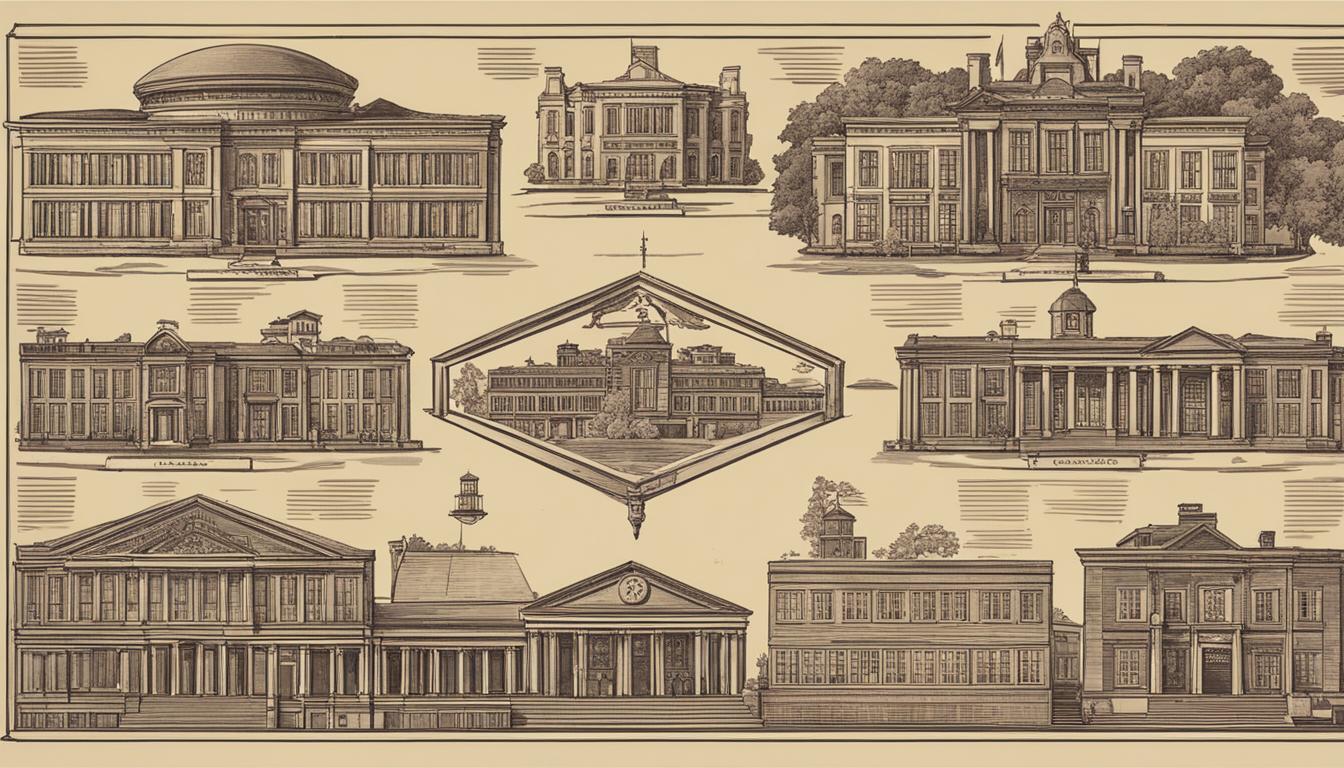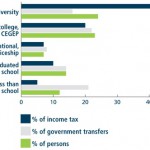Navigating the higher education landscape can prove perplexing with terms like college vs university often causing a stir among students aiming for that next big academic leap. In the quest to elucidate the difference between college and university, it’s crucial to peel back the layers of these terms which, at face value, may seem synonymous in the American education ethos. Yet, beneath the surface, a college versus university comparison reveals core structural and academic dissimilarities that can wield a significant impact on a student’s educational journey and future career trajectory.
The quintessential question – what is the difference between college and university – resonates with an urgency for clarity, particularly among international students exploring their options in the United States and Canada. Understanding these distinctions is paramount; it sharpens the focus on what each institution has to offer in line with their diverse program structures, degree offerings, and educational philosophies.
Key Takeaways
- Colleges tend to be smaller institutions primarily offering undergraduate education, such as liberal arts, technical, or community colleges.
- Universities are larger institutions that provide a range of undergraduate and graduate programs, often emphasizing a research-based education.
- The term usage of college versus university may vary internationally, affecting student perceptions and choices.
- In North America, the difference between college and university is not merely semantic but reflects a distinction in program breadth and degrees offered.
- Choosing between a college or university depends on a student’s academic goals, learning style, and career aspirations.
The Confusion in Terminology: College and University Interchangeable?
When deliberating on the difference between college and university, many students and educators in the U.S. might assert that both terms are essentially synonymous. This common interpretation, however, does not extend across all borders. In fact, in some countries, particularly Canada, college and university distinctions are more prominent and crucial to understanding the higher education system. While in the U.S., the term ‘college’ can often be used as a catch-all for any higher education institution, international students must recognize the nuances to make informed decisions that align with their academic ambitions and career plans.
In Canada, for example, a college traditionally connects students with vocational or technical education through hands-on training. The focus is job-oriented, and the objective is clear: to prepare graduates for immediate entry into chosen career paths. Conversely, universities delve into academic and professional realms, offering broader, more theoretical degree programs engineered to cultivate research and analytical skills necessary for professional success. Despite these differences, students pondering college or university may find themselves asking essential questions regarding their goals and the type of learning environment they wish to immerse themselves in.
To illustrate these contrasts more vividly, consider the following table comparing the attributes of colleges and universities:
| Attribute | College | University |
|---|---|---|
| Primary Focus | Career-oriented training | Academic and advanced degrees |
| Programs Offered | Diplomas, certificates, and in some cases, applied degrees | Undergraduate, graduate, and postgraduate degrees |
| Class Size | Smaller, more intimate learning settings | Larger lectures, with varied class sizes depending on course level |
| Cost of Attendance | Typically more affordable with varied options | Higher due to longer programs and more expansive facilities |
| Learning Approach | Practical, hands-on experience | Theoretical, research-focused curriculum |
| Length of Study | Often 2-3 years for full programs | 4 years for undergraduate; additional years for graduate degrees |
Thus, while the terminology may be used interchangeably within the U.S., the college and university distinctions are far more significant. Understanding these differences is key to pursuing post-secondary education that aligns with specific career goals, whether it be the practice-focused approach of a college or the research-intensive environment of a university.
Distinguishing Characteristics of Universities
When choosing between college and university, it is essential to grasp the distinctive characteristics that set universities apart. Not only do they offer a broad spectrum of academic programs, but they also provide a unique blend of social and cultural experiences that contribute to personal growth and learning. This section dives into the valuable aspects of attending a university, from the comprehensive offerings to the vibrant community life, underscoring the differences that make the university experience unlike any other.
Comprehensive Offerings: Undergrad to Grad Programs
Universities are known for their comprehensive educational offerings that extend from undergraduate to graduate levels. Unlike colleges, universities often have a broad selection of bachelor’s, master’s, and doctoral programs, allowing students to continue their education and research within the same institution. Large public universities such as Texas A&M serve over 70,000 students across diverse fields of study, illustrating the magnitude and inclusivity of university vs college educational scopes.
Campus Life and Diversity at Universities
The campus life at a university is unmatched in its diversity and breadth of experiences. Students have the opportunity to immerse themselves in a dynamic environment where they can engage with peers from various backgrounds, join a multitude of clubs and societies, and participate in a variety of campus events. This rich campus life enhances the overall university experience, making it a melting pot of cultures and ideas.
The Role of Research in University Education
Another defining element of a university is its strong emphasis on research. Institutions such as Johns Hopkins University and Stanford University are not just educational centers but also hubs of innovation and discovery, with annual research budgets running into the billions. This focus on research fosters a cutting-edge learning environment where students can contribute to significant scholarly and practical advancements in their respective fields.
| Feature | Advantages of Universities | Drawbacks of Universities |
|---|---|---|
| Program Range | Extensive selection from undergrad to postgraduate levels | May be overwhelming due to the abundance of choices |
| Class Size | Offers both large lectures and small seminars | Large class sizes may impact personal interactions with faculty |
| Cost | Potential for higher returns on investment in the long-term | Higher cost of attendance, leading to potential student debt |
| Learning Environment | Dynamic, diverse, and research-oriented | Can be challenging for students seeking a more personalized approach |
| Research Opportunities | Access to state-of-the-art facilities and resources | Focus on research may detract from teaching quality |
Advantages and Drawbacks of Attending a University
Choosing to attend a university presents a set of advantages, such as exposure to a variety of disciplines, opportunities to engage in groundbreaking research, and potentially greater long-term career prospects. However, prospective students must also consider potential drawbacks, such as the higher cost of education and the possibility of feeling like just another face in the crowd in large, lecture-hall settings.
Defining the College Experience
The decision between pursuing education at a college versus a university hinges on recognizing their distinct offerings. Many students find themselves at a crossroad, contemplating the college and university difference, each path presenting specific advantages that align with unique personal and professional goals. As we define the college experience, we uncover a realm that embraces smaller class sizes and personalized attention—a hallmark of these institutions.
Small Class Sizes and Personalized Attention
Colleges are often characterized by their intimate campus settings, where lower student-to-faculty ratios allow for personalized interactions and tailored support. This facet of the college experience can be particularly appealing for students seeking a nurturing environment conducive to individualized learning and mentorship.
The Array of College Types: Community to Liberal Arts
Within the college landscape lies a spectrum of institution types, from community colleges that open doors to higher education with affordability and convenience, to liberal arts colleges that champion a broad-based education designed to cultivate well-rounded scholars adept at critical thinking across various disciplines.
Focusing on Vocational Training and Practical Skills
Vocational and technical programs offered by colleges emphasize equipping students with practical skills and industry-specific knowledge. This targeted approach results in graduates poised for direct entry into the workforce, armed with hands-on experience and valuable credentials in the form of certificates or associate degrees.
Pros and Cons of Choosing a College Path
Deciding on a college route comes with its set of benefits and drawbacks. Pros include more affordable education pathways, as seen with community colleges, and the pragmatic essence of vocational training that aligns skill development with labor market demands. However, students may also face limitations in the breadth of program options and reduced access to resources when juxtaposed with the offerings of a university. It’s crucial to understand these facets when measuring the difference between university and college.
| Consideration | Advantages | Disadvantages |
|---|---|---|
| Size and Scale | Smaller community fosters closeness and support | Can limit networking opportunities and resources |
| Program Focus | Concentrated studies geared towards specific careers | Fewer broad-based programs compared to universities |
| Educational Cost | Typically lower tuition fees | Potential for lesser financial aid packages |
| Post-Graduation | Direct entry to career with applicable skills | May require additional education for advancement |
As we delve into the characteristics that demarcate a college and university difference, prospective students are better positioned to chart their academic voyage. In acknowledging these distinctions, one is empowered to make an informed choice that harmonizes with their aspirations and learning preferences.
Exploring Liberal Arts Colleges: A Unique Educational Approach
Amidst the college versus university comparison, liberal arts colleges emerge as distinctive educational havens that champion the philosophy of breadth over specialization. This approach is geared toward creating adaptable, broad-minded graduates equipped for versatile career paths. Here, we delve into the canvas of a liberal arts education, highlighting how such institutions provide an education that is not just comprehensive but intrinsically versatile, setting the stage for a multitude of career possibilities.
Breadth Over Specialization: The Curriculum
Liberal arts colleges such as Williams College and Swarthmore College stand out in the similarities and differences between college and university for their dedication to a holistic curriculum. They require students to study a diverse array of academic fields, fostering well-rounded thinkers. Coursework typically spans the humanities, the natural sciences, math, the social sciences, and the arts – a blend that cultivates a breadth of knowledge and critical thinking skills.
Preparing for a Diverse Range of Careers
Unlike specialized career-focused programs, a liberal arts college education is designed with the overarching goal of preparing students for a diverse range of industries. Graduates are often regarded for their ability to adapt and excel in multiple career domains. This educational approach keeps doors open across various sectors, ensuring students possess the transferable skills essential for success in the evolving job market.
An Overview of Community Colleges and Their Role
Within the landscape of higher education, community colleges serve as a pivotal starting point for many students, offering a gateway to further academic pursuits or entry into the workforce. A thorough comparison college and university reveals that community colleges, often referred to as junior colleges, primarily provide two-year programs that culminate in associate degrees or certificates. These institutions are instrumental in making education more accessible and affordable, resonating with a broad demographic of learners.
Community colleges are lauded for their lower tuition rates, which stand as a cornerstone of their appeal, allowing students from varied socio-economic backgrounds to commence their educational endeavors without the daunting prospect of significant debt. Furthermore, the individualized classroom settings in these colleges foster an environment conducive to tailored teaching methods and the nurturing of student potential.
One of the critical functions of community colleges is to lay the groundwork for students before they make the transition to larger universities. With comprehensive general education programs, these colleges equip students with foundational academic competencies requisite for success at the university level. The concerted focus of community colleges on preparing students both for the workforce and for further academic study underscores the essential contrast in the comparison college and university spectrum.
| Aspect | Community College | University After Transfer |
|---|---|---|
| Program Length | 2-year programs leading to associate degrees or certificates | 2 extra years post-transfer for a Bachelor’s Degree |
| Cost | Lower tuition rates suitable for budget-conscious students | Higher tuition rates, although offset by community college credits |
| Educational Approach | Focus on general education and foundational studies | Advanced study with options for specialization |
| Classroom Environment | Smaller, individualized settings | Larger class sizes, more diverse student body |
| Outcome | Certification and Associate Degrees with workforce readiness | Bachelor’s degrees with potential for higher earnings |
The educational model of community colleges fosters a multifaceted role within society by providing a fiscally responsible avenue towards higher education, while also catering to individual learning preferences. These colleges offer significant flexibility, allowing students to pursue part-time studies, night courses, and even online learning options that accommodate various life commitments.
Ultimately, the choice between a community college and a university is a decision steeped in personal goals, financial considerations, and preferred learning environments. As such, community colleges stand as a testament to the diversity of educational pathways available within the academic landscape, each playing a distinctive role in shaping the futures of aspiring students.
Technical and Vocational Colleges: Specialized Training for the Workforce
Amid the college versus university comparison, technical and vocational colleges carve out a unique niche with their specialized career training. These institutions are laser-focused on equipping students with the necessary skills and knowledge for specific trades and professions. Tactile-learning enthusiasts and career pragmatists alike find solace in the practical, skill-oriented programs these colleges provide.
With an ethos grounded in the real world, these colleges offer an array of programs that are not only industry-responsive but also condensed and intensive. Aimed at forging a direct pathway to the labor market, the curriculum is designed with the demands of today’s trades and technical roles in mind. Students emerge not merely educated but trained, with a proficiency honed for the workplace.
The curriculum at these colleges is streamlined to ensure that every course, every lab exercise, and every practicum aligns with the competencies and techniques valued by employers. This approach appeals particularly to those with a clear career trajectory, empowering them to transition seamlessly from classroom to career.
| Feature | Technical College | Vocational College |
|---|---|---|
| Program Length | 1-2 years | Less than 1 year |
| Educational Focus | Hands-on technical skills | Specific vocational training |
| Degree Outcome | Associate degree | Certificates |
| Industry Fields | Electrical, Plumbing, IT | Cosmetology, Culinary Arts, Healthcare |
| Learning Environment | Workshop and laboratory settings | Practical, on-site experiences |
| Benefit to Students | Developing technical expertise | Quick entry into chosen trade |
In the context of a broader college versus university comparison, what stands out for technical and vocational colleges is their commitment to a directive educational style. Here, theoretical knowledge takes a back seat to actionable, vocational proficiency. Graduates are not just learners but doers; not just students, but practitioners ready to ply their trade with both confidence and competence.
Analyzing the Pros and Cons of Universities
When reflecting on the college versus university comparison, it’s imperative to scrutinize the advantages and drawbacks that come with pursuing higher education at a university. The decision between college vs university can significantly influence one’s academic and professional future. Below, we evaluate the financial implications, the impact of class sizes, and the inherent value of a university degree in today’s job market.
Evaluating the Financial Implications
Universities often present an extensive range of program options and advanced courses, which contribute to their reputation for fostering innovation and academic excellence. These opportunities come at a cost, however, translating into considerable tuition fees and associated expenses. While investing in university education promises a potential return through lucrative career paths, students must weigh this against the reality of student loan debt and the financial burden it can create. The table below highlights these financial nuances:
| Financial Aspect | Advantage | Disadvantage |
|---|---|---|
| Program Diversity | Access to a wide selection of courses and specialties | Higher tuition and fees |
| Long-term ROI | Greater earning potential with higher degrees | Longer duration to achieve ROI due to debt |
| Financial Aid & Scholarships | University-specific scholarships are often substantial | High competition and stringent criteria for awarding aid |
| Living Expenses | University campuses offer comprehensive amenities | Cost of campus living often exceeds off-campus options |
| Research Funding | Opportunities for funded research positions | Often tied to rigorous academic commitment |
Understanding the Impact of Large Class Sizes
As one dives deeper into the college vs university debate, the university experience is often characterized by larger class sizes, particularly in lower-division courses. This aspect can impact the accessibility of professors and the quality of individual academic support. Large class sizes may also dilute the personal engagement a student has within the classroom, potentially affecting the learning process. However, it is worth noting that upper-division university courses tend to offer more intimate settings, fostering closer interactions between students and faculty.
The Value of a University Degree in the Job Market
The long-standing notion that a university degree is a golden ticket to a successful career continues to hold traction, though the landscape is evolving. University alumni often have access to higher-paying positions and wider career prospects, given the demand for advanced skills and specialized knowledge in many industries. That said, with the rise of skilled trades and the tech industry, some argue that the value of university degrees in certain sectors now competes with vocational training and certifications, highlighting the multifaceted nature of the college vs university analysis.
Assessing the Pros and Cons of Colleges
When making a comparison college and university, it is essential to explore both the advantages and the challenges that colleges present to students. At the heart of the decision-making process are the differences between college and university, which can influence a student’s educational and professional future. Colleges are frequently celebrated for their emphasis on undergraduate education and for being more affordable options compared to universities.
However, the coin does have another side. Colleges typically offer a narrower spectrum of courses and may not have the same breadth of resources found in comprehensive university settings. The smaller scale of colleges can lead to a more close-knit learning community, but it might also result in fewer opportunities for networking and exploring a variety of academic disciplines. Additionally, compared to universities, financial aid packages at colleges are often more limited, which requires careful consideration from prospective students.
In unpacking the differences between college and university, it is imperative to systematically evaluate the benefits and drawbacks. The following table presents a concise comparison of what prospective students might expect when considering colleges as their destination for higher education:
| Assessment of Colleges in a Comparison College and University Context | |
|---|---|
| Pros of Colleges | Cons of Colleges |
| More personalized undergraduate teaching | Limited variety of courses |
| More affordable tuition costs | Less diversity in the student body and academic disciplines |
| Smaller class sizes for focused instruction | Insufficient resources compared to larger universities |
| A supportive community atmosphere | Restricted access to financial aid and scholarships |
This evaluation framework provides a structured approach to understanding the core differences between college and university, enabling students to make informed decisions based on their individual academic needs and financial considerations.
Ultimately, students looking into their higher education options are encouraged to reflect on their career goals, learning preferences, and financial status. When it comes to the comparison college and university dilemma, the best choice is the one that aligns with a student’s personal and professional aspirations, leading them to the future they envision for themselves.
What About Colleges Within Universities?
In the broader discussion surrounding the comparison college and university, there exists a configuration where colleges form integral components of universities, generally referred to as “schools” or “colleges within universities”. These entities specialize in specific fields of study—such as business, law, or engineering—and come replete with tailored resources and a focused academic community. They offer an added layer of depth to the expansive educational landscape of a university, creating unique ecosystems within the larger institution.
Decentralized Education: Specialized Colleges
Colleges that nestle within the infrastructure of a university embody the ethos of decentralized education. These specialize in distinct streams, from the College of Fine Arts to the School of Public Health, with each providing a focused curriculum and pioneering instruction that align seamlessly with industry requirements. For instance, engineering colleges are typically replete with cutting-edge labs, while conservatories provide modern performance spaces. This modularity allows for concentrated study and potentially heightens the integrity and vigor of one’s academic endeavor.
Impact on Student Community and Opportunities
The existence of specialized colleges within a university stretches beyond academics. It also enriches the student community, offering congregate spaces for students, faculty, and professionals sharing similar pursuits and passions. These colleges often operate their own societies, journals, and networking events, which can significantly embolden both the communal feel and the professional trajectory of its members. Moreover, the selective nature of some programs may influence admissions, dissolving the one-size-fits-all approach and inviting a process that appreciates the particular aptitudes and aspirations of applicants.
| University Feature | Specialized College within University | Overall University Campus |
|---|---|---|
| Focus | Concentrated on specific disciplines | Comprehensive across multiple areas of study |
| Community | Close-knit, fostering networking within specialty | Diverse, ideal for interdisciplinary interaction |
| Facilities | Customized for particular fields | Generalized for broad student use |
| Admissions | Potentially specialized application requirements | Standardized university criteria |
| Learning Environment | Deep dive into focused educational experiences | Varied, with both general and specialized offerings |
Integrating into the framework of a large institution, colleges within universities represent an intimately connected, yet distinctively autonomous experience. They nurture in-depth scholarship within particular fields while inheriting the benefits of the university’s expansive resources. This setup is a beacon for those deliberating university vs college—it exemplifies how a university’s architecture can enclose the immersive, specialized journey akin to a college.

Diverse Approaches to Post-Secondary Education in Canada
As students in Canada navigate the critical decision of choosing between college and university, they are met with a variety of post-secondary pathways each tailored to distinct educational and professional goals. Understanding the similarities and differences between college and university is vital in forging a future that aligns seamlessly with their aspirations.
Curriculum and Degree Variations Between College and University
The landscape of Canadian post-secondary education embodies a rich tapestry of institutions, each with offerings designed for different life paths. Colleges provide focused, career-oriented programs often culminating in diplomas or certificates – targeted education that typically takes less time to complete than a university degree. Universities stand as bastions of extensive study, offering majors and minors in various academic fields and conferring undergraduate and graduate degrees after several years of dedicated learning.
For those mulling the pivotal question of what’s the difference between college and university, the most evident distinction lies in the duration and depth of study. Colleges excel in delivering education that dovetails with the immediate needs of the labor market, preparing students rapidly for specific vocational roles. Meanwhile, universities furnish learners with a profound exploration of their chosen fields, often incorporating research and theoretical underpinnings that stretch beyond immediate career applicability into broader realms of knowledge and innovation.
Understanding the Canadian Education System
In Canada, the post-secondary education system is bifurcated into colleges and universities, each serving a unique purpose within the spectrum of higher education. A closer examination of this system reveals colleges as the nexus of hands-on training and experiential learning, where the focus is to equip students with practical skills and knowledge paramount for job market entry. Universities, conversely, take a more holistic and research-oriented educational approach, undergirding students with comprehensive academic instruction often required for advanced professional pursuits. Thus, the journey one takes in the Canadian education system is reflective of their long-term educational and career goals, whether they seek to quickly join the workforce or to invest in an extensive education that may offer a wider range of opportunities in the future.
| Factor | College | University |
|---|---|---|
| Program Type | Career-focused, skills-based | Academic, research-oriented |
| Program Length | Shorter (diplomas, certificates) | Longer (bachelor’s, master’s, doctorates) |
| Teaching Approach | Hands-on, experiential | Theoretical, analytical |
| Curriculum | Specific to a career/trade | Diverse, with options for majors/minors |
| Outcome | Quick entry into the workforce | Preparation for advanced careers/professions |
The decision on choosing between college and university in Canada is more than a simple selection of an institution; it reflects a commitment to a certain kind of educational philosophy and learning style. It is a matter of determining the most conducive environment for one’s desired outcome, be it acquiring immediately marketable skills or engaging in an extensive, potentially more versatile educational experience.
Choosing Between College and University: Factors to Consider
As students ponder the significant decision of choosing between college and university, understanding the similarities and differences between college and university is vital. Numerous factors such as program length, career goals, cost, learning format, and personal learning style come into play when navigating this crossroad. In Canada, with colleges often targeting more career-oriented programs and universities dedicating themselves to broader, research-oriented education, the deliberation becomes even more nuanced.
Evaluation of various elements can guide learners in making the right choice that aligns not only with their immediate educational needs but also with their long-term professional aspirations. The following table presents a clear comparison of some essential aspects to consider when making this crucial life decision:
| Factor | College | University |
|---|---|---|
| Program Length | Short-term programs (1-3 years for diplomas and certificates) | Long-term programs (3-4 years for bachelor’s degrees, more for graduate studies) |
| Educational Focus | Career-focused with practical skills | Academic, research-heavy, with a theoretical basis |
| Cost | Generally lower tuition fees | Higher tuition fees due to longer program durations and infrastructural facilities |
| Career Objectives | Immediate job readiness and skill-specific training | Broad career prospects with opportunities for specialization |
| Learning Format | Hands-on training, often with practicums or apprenticeships | Lecture-based instruction with potential for internships |
| Personal Learning Preferences | Suitable for those who prefer smaller class sizes and a focused approach | Ideal for individuals seeking diverse educational experiences and larger networks |
In the journey of choosing between college and university, students should deeply reflect on their educational requirements and how they align with both the structured setting of a college and the expansive environment of a university. Every choice has the potential to pave a unique path that matches the individual learning style and career path of the student.
Whether opting for the specialized, skill-based curricula offered by colleges or the comprehensive, research-driven programs at universities, the decision must be informed by a careful appraisal of each institution’s offerings against one’s own academic and professional goals. Exploring and understanding these factors thoroughly empowers students in Canada and beyond to step confidently towards their future success within their chosen field.
The Difference Between College and University: A Deep Dive
In unraveling the difference between college and university, it becomes evident that the educational systems in Canada distinguish between the two based on their inherent educational focus, program objectives, and outcomes for students. A common query among those considering higher education is precisely what’s the difference between college and university? This section embarks on a detailed exploration of these differences, providing insights into the choices available for Canadian students.
Colleges in Canada are synonymous with practical, career-oriented training. They provide hands-on educational experiences that are designed to prepare students for employment shortly after graduation. The programs offered at colleges tend to be succinct and highly focused, leading to diplomas, certificates, and occasionally applied bachelor’s degrees. This model of education is well-suited for students eager to enter the workforce with a specific set of skills.
Universities, on the other hand, are celebrated for a research-based, comprehensive approach that extends beyond the immediacy of career preparation. Universities furnish students with a broad spectrum of undergraduate, master’s, and doctoral programs, cultivating an environment that inspires deep academic inquiry, research, and innovation. This broad and inclusive approach is intended for students who aspire to have a profound understanding of their field of study, possibly pursuing academic or highly specialized professional careers.
To encapsulate the contrasts, let’s examine a comparative table that outlines the defining attributes of colleges and universities in Canada:
| Education Focus | Colleges | Universities |
|---|---|---|
| Objective | Career Readiness | Academic Mastery & Professional Expertise |
| Programs Offered | DiplomasCertificatesApplied Degrees | Bachelor’s DegreesMaster’s DegreesDoctorates |
| Duration | 1-3 Years | 3-10 Years (depending on degree level) |
| Learning Environment | Hands-on Training and Apprenticeships | Research-Oriented and Theoretical Study |
| Outcome | Immediate Skill Application and Job Entry | Preparation for Advanced Careers and Research Opportunities |
This comprehensive comparison is a starting point for students wrestling with the decision between pursuing education at a college versus a university. It provides clear evidence that while the terms college and university may often be used interchangeably, in Canada, they represent fundamentally different paths within the sphere of higher education.

The path a student chooses should align with their career aspirations, preferred learning style, and the level of specialization they wish to achieve. Regardless of the decision, both colleges and universities are vital contributors to the rich fabric of Canadian education, each playing a unique role in equipping students for the real-world challenges that await them post-graduation.
How Job Market Outcomes Differ for College and University Graduates
Zeroing in on the difference between college and university, one finds divergent paths leading to the job market. Whether it be the readiness and applicability of skills from college graduates or the theoretical prowess and specialized acumen of university alumni, the outcomes in the job arena exhibit marked contrasts. As we scrutinize these distinct journeys, it becomes clear that the college vs university debate extends into the realm of employment prospects, career growth, and financial futures.
Employment Prospects After College
College graduates, armed with practical skills and vocational training, often navigate directly into the job market. These individuals typically benefit from career-specific training, leading to earlier employment opportunities, particularly in skilled trades. Such quick workforce entry is a substantial advantage for those eager to launch their careers without extended educational timelines. The following table encapsulates the job market prospects for college graduates:
| Advantage | Outcome | Industry Sectors |
|---|---|---|
| Career-Specific Training | Immediate Employment | Skilled Trades, Technology |
| Shorter Education Span | Early Career Start | Healthcare, Business |
| Applicable Skills | Workforce Readiness | Construction, Culinary Arts |
Career Advancement and Salaries for University Alumni
Conversely, university graduates often behold a different employment landscape. With an education rich in theory and analytical skills, these individuals may step into the job market later but with higher earning potential. University alumni are poised to fill professional roles that require advanced degrees and specialized expertise across fields such as medicine, law, and academia. Their career advancement trajectories and salaries reflect a longstanding investment in education, as summarized in the informed overview below:
| Advantage | Career Path | Earning Potential |
|---|---|---|
| Advanced Degrees | Professional Roles | Higher Salary Brackets |
| Specialized Knowledge | Academic/Research | Sustainable Growth |
| Broader Skill Sets | Corporate Leadership | Long-Term ROI |
In sum, graduates of colleges and universities have different storytelling when it comes to integrating into the workforce. The key is to gauge which educational path aligns with one’s career aspirations and desired timeliness for job market entry. The difference between college and university thus resonates not only in academic experiences but also in their catalytic roles shaping job market outcomes and professional futures.
Conclusion
The journey through higher education is laden with decisive moments, and none as pivotal as understanding the difference between college and university. In Canada, where the college versus university comparison holds notable distinctions, students stand at the crossroads of choice, each path leading to unique scholastic and professional landscapes. Colleges offer the allure of career-focused programs designed for swift immersion into the job market, ideal for those aiming to master specific vocational skills without delay. Universities beckon with their promise of advanced degrees, encouraging broad intellectual exploration and specialization within disciplines over several years.
Prospective students must engage in a meticulous balancing act, considering not just their immediate educational goals but also their long-term career aspirations. Financial investment, time commitment, and personal preferences in learning environments remain critical factors in this equation. Whether the choice leans towards the hands-on, skill-based nurturing of a college or the expansive, research-intensive scholastic terrain of a university, aligning with one’s vision for the future is paramount.
As we wrap up our discourse on this vital academic query, we reaffirm the essence of the college versus university comparison as an individualized match to one’s ambitions. In the end, it is a blend of self-awareness and pragmatic planning that will illuminate the path to a fulfilling and successful educational experience. The distinctions between these institutions serve as guiding stars, helping students in Canada chart a course to their dreams, equipped with knowledge, skills, and a diploma or degree that opens doors to their chosen future.
Source Links
- https://settlement.org/ontario/education/colleges-universities-and-institutes/what-is-post-secondary-education/what-is-the-difference-between-college-and-university-in-canada/
- https://www.bestcolleges.com/blog/difference-between-college-and-university/
- https://www.robertsoncollege.com/news/studying-at-robertson/difference-between-college-and-university/
What is the main difference between a college and a university?
The primary difference between a college and a university is their focus and size. Colleges are typically smaller institutions that concentrate on undergraduate education with more personalized attention and often providing vocational or technical training. Universities are larger institutions that offer both undergraduate and graduate programs, with a strong emphasis on research and a broader array of academic fields.
Are the terms college and university interchangeable?
In the United States, the terms are often used interchangeably to refer to any higher education institution. However, there is a distinct difference in countries like Canada, where colleges are more career-focused and universities provide a broader, more academic education.
What are the distinguishing characteristics of a university?
Universities typically offer a wider range of programs, including bachelor’s, master’s, and doctoral degrees. They are known for large campus environments, diverse student bodies, and substantial investment in research. Universities generally have more extensive facilities and resources when compared to colleges.
What defines the college experience?
The college experience is often characterized by smaller class sizes, personalized attention, and a focus on undergraduate education. Colleges provide a range of programs including associate degrees, certificates, and vocational training designed to prepare students for immediate entry into the workforce or further study.
What is the role of liberal arts colleges?
Liberal arts colleges emphasize a broad-based education across the humanities, science, and arts. They aim to provide students with a well-rounded set of skills that are adaptable across various careers, rather than preparing them for one specific job.
What is the function of community colleges?
Community colleges, often known as junior colleges, primarily focus on offering two-year associate degrees and certificates. They serve as an affordable option for students to complete general education requirements or gain job-oriented skills, often before transferring to a four-year university.
How do technical and vocational colleges differ from traditional colleges or universities?
Technical and vocational colleges focus on providing specialized training designed to prepare students for a particular trade or career. These programs are more hands-on and skills-based compared to the more academic programs offered by traditional colleges or universities.
What are the pros and cons of attending a university?
The pros of attending a university include access to a vast array of programs, diverse social opportunities, and research facilities. However, the cons may include larger class sizes, potentially less personal interaction with professors, and higher tuition costs.
What are the benefits and drawbacks of choosing a college?
Colleges often benefit students through more focused teaching, smaller class sizes, and lower tuition costs. Drawbacks may include limited program variety and fewer resources compared to universities.
Can you find colleges within universities?
Yes, many large universities have individual colleges or schools dedicated to specific fields of study, such as Business, Engineering, or Fine Arts. These specialized colleges within universities can offer tailored resources and a sense of community while still providing access to the broader university environment.
How do college and university curriculums differ in Canada?
In Canada, colleges usually offer diploma and certificate programs focused on practical skills for specific careers. Universities offer degree programs, including bachelor’s, master’s, and doctoral studies, with a broader academic approach that involves majors, minors, and a focus on research.
What should you consider when choosing between a college and a university?
Prospective students should evaluate factors such as their career goals, the length and type of program they’re interested in, learning preferences, and financial considerations. These factors can greatly influence whether a college or a university is the better fit for them.
How do job market outcomes differ for college and university graduates?
College graduates may enter the job market sooner with skills for specific trades or careers. University graduates often pursue professions that require advanced degrees and may benefit from higher potential earnings over time. Each pathway has its distinct advantages depending on individual career objectives.
How is college different from university?
A college typically offers diplomas, certificates, and associate’s degrees while a university offers bachelor’s degrees, master’s degrees, and doctorate degrees. Colleges usually have a more career-focused curriculum while universities focus more on academic theory and research. Class sizes also tend to be smaller at colleges than universities.
Which is better college or university degree?
It depends on your goals. College diplomas and associate degrees take less time and allow you to enter the workforce faster while university bachelor’s degrees and beyond allow you to enter fields that require more advanced education. University degrees also better prepare you for graduate studies.
Is Harvard a university or a college?
Harvard is a private Ivy League research university consisting of several colleges that grant undergraduate and graduate degrees in various fields. The formal name is Harvard University, where “university” indicates it grants bachelor’s, master’s, and doctoral degrees.
How many years is university in Canada?
A bachelor’s degree at a Canadian university typically takes 4 years of full-time study. Some specialized programs like engineering or education take between 4 to 5 years to complete. Master’s degrees usually require 1-3 years of study after a bachelor’s, while doctorates take about 4 years after a master’s.
What is a 2 year degree called in Canada?
A 2-year degree in Canada is typically called a college diploma or an associate’s degree. These are offered by colleges and some universities as more career-focused alternatives to a 4 year bachelor’s degree, allowing entry into the workforce sooner.
Should I study in college or university in Canada?
If you want hands-on career training for entering the workforce quickly, choose college. If you want an academic, research-focused education and the option for higher-level graduate and professional degrees later on, choose university. Also consider your field of interest – some like trades and creative arts are better suited for college.
What is the easiest degree to get in Canada?
Some of the potentially easiest undergraduate degrees to obtain in Canada include arts, communications, psychology, sociology, English literature, history, and political science. These programs have relatively high acceptance rates and graduation rates compared to more technical degrees. However, “easy” is subjective and depends on individual strengths.
Can I go to university after college?
Yes, you can go to university after completing a college diploma or associate degree. Many colleges have transfer agreements with universities as well. Your college credits and courses may be transferable to a bachelor’s degree at a university, allowing you to finish your degree faster.
Does 2 diplomas equal a degree?
No, two college diplomas by themselves do not typically equate to a bachelor’s degree in Canada. However, if you complete a 3-year college diploma and then a 2-year “bridge” program, you may be able to earn a university bachelor’s degree. Or if you transfer enough individual college courses, you can sometimes obtain a degree without completing the “bridge”.















